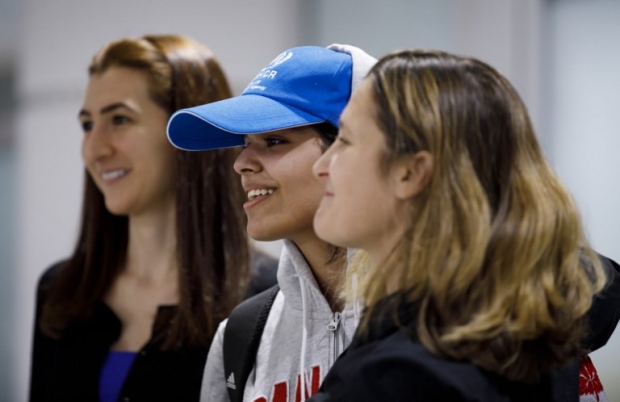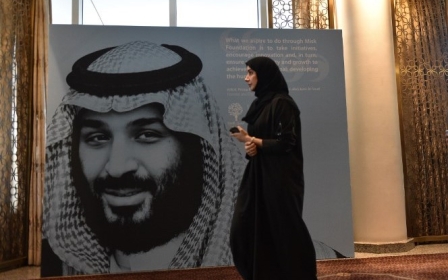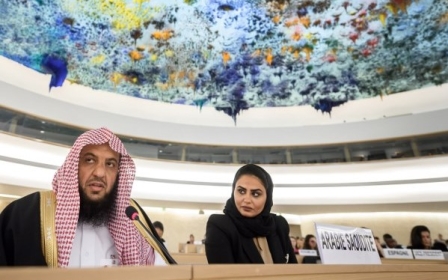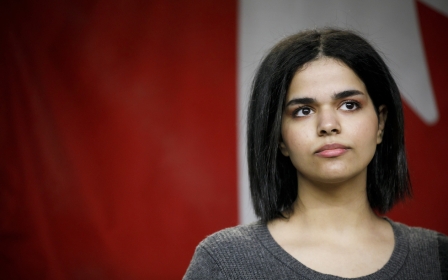Why Canada should not have allowed Rahaf al-Qunun to tweet her way to Toronto
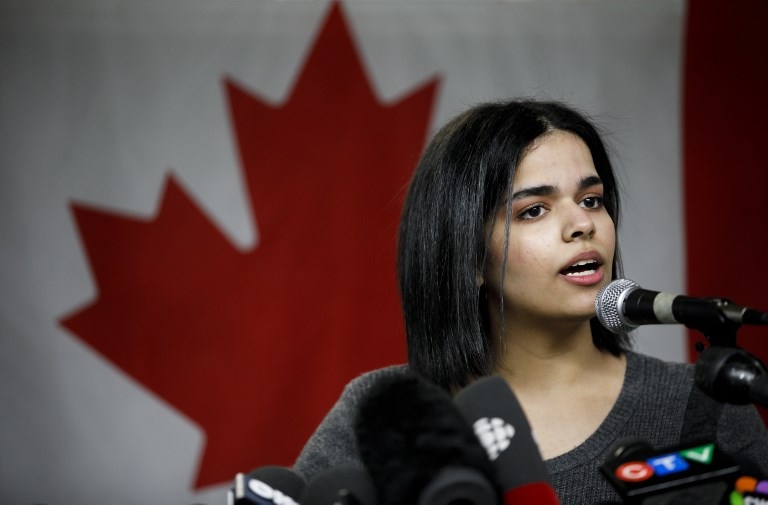
I am a critic of Saudi Arabian human rights violations, but I still think Canada did the wrong thing in granting expedited asylum to Rahaf Mohammed al-Qunun.
The Saudi teen did exactly what anyone escaping alleged abuse and potential death would have done. She captivated the world on social media by barricading herself in an airport hotel room in Bangkok. She amassed tens of thousands of followers on Twitter in one day with the #SaveRahaf hashtag. In the ensuing global attention, the United Nations High Commissioner for Refugees (UNHCR) rightfully took up her claim.
Having written against Saudi human rights abuses, I sympathise with al-Qunun and understand her fear. I am glad she made it to Canada safely and wish her well.
Yet, there are at least five reasons why Canada made the wrong decision in actively pursuing her and welcoming her as though she were a state guest. Indeed, her arrival at the Toronto-area airport wearing a hoodie emblazoned with “Canada”, into the welcoming arms of Foreign Minister Chrystia Freeland, was awkward to say the least, though it served as a wonderful pre-election photo op.
Jumping the queue
Firstly, the Liberals undermined Canadian refugee laws and procedures by effectively allowing her to jump the “queue”. Yes, of course there is no technical queue for refugees, but tell that to the 25 million UN-designated refugees. About 1.4 million of them have been identified for resettlement in 2019, yet only about 80,000 spots are available among the countries open to accept them.
Roughly 100 people are processed under Canada's Urgent Protection Program each year in an expedited fashion; a candidate must satisfy certain criteria revolving around imminent danger or threat. In al-Qunun’s case, the UNHCR had stepped in, and she was not going to be sent back to her alleged tormentors.
It is a generally agreed-upon principle that a refugee should settle in their first “safe country”. Her first choice was Canada, but her first country was Thailand. If she preferred Canada, she could have gone through the regular channels at a later time.
Of course, she still must prove her case, but it is easy to see that other - arguably even more deserving - claimants may justifiably feel cheated and angry
Secondly, Qunun effectively petitioned politicians through social media and bypassed the established immigration channels. Her tweets got her to a stage that millions of others, including far too many who may be in even more imminent danger, can even dream about. Once determined to be a refugee by the UN, an individual has to be screened by a Canadian border agent, Royal Canadian Mounted Police officer or immigration official, depending on where they filed their claim. The agent decides if the claimant is eligible to seek refugee status in Canada.
In al-Qunun’s case, she tweeted, got media attention, and the Canadian government essentially recruited her. Of course, she still must prove her case, but it is easy to see that other - arguably even more deserving - claimants may justifiably feel cheated and angry.
A diplomatic blunder
I have previously argued that Asia Bibi, the Pakistani-Christian woman threatened and targeted for allegedly committing blasphemy should have been granted asylum by Canada. Her prima facie case is much stronger. She continued to be hunted even after the Pakistani Supreme Court acquitted her. Protesters hijacked the country for weeks until the state caved in and agreed to a further review of her case.
In contrast, al-Qunun claims abuse and potential violence, both of which would technically be crimes according to Saudi state law. Moreover, abuse, as deplorable as it is, is not grounds to claim refugee status. If it was, then millions all over the world would have a claim for asylum.
With respect to her claim that she would face death for leaving Islam, of course this is unacceptable and problematic, because Saudi state law is contrary to international human rights norms. She was most likely granted refugee status by the UNHCR and Thailand based on this, but the procedural issues with how her case was handled still stand.
It is also unclear as to what Canadian interest this decision advanced. As Dennis Horak, Canada's recently expelled ambassador to Riyadh, told the press, the case may spur discussion about the kingdom's controversial guardianship laws, which mandate that all females be treated as minors with a male relative in charge, or it could “spark a conservative backlash, with families further tightening restrictions on daughters”. Moreover, the 20,000 Saudi Canadian expats may encounter some difficulties in terms of employment, visa renewals, etc.
Raising false hopes
Commenting on Freeland’s tweet chastising Saudi Arabia on an earlier human rights issue, another former Canadian ambassador to Riyadh, David Chatterson, wrote that Canada’s approach towards Saudi Arabia reflects “the politicization of our foreign policy”, citing a government tendency to focus “on how our actions or inactions could provide their party with political or electoral advantage”.
Fourthly, Ottawa’s decision is raising false hopes. Will Canada accept all others who successfully highlight their plight via social media? Practically, this would be impossible. Lofty pronouncements have consequences.
What happens to those who expose themselves - renouncing their faith, or coming out of the closet on a sensitive issue - on social media and are then not rescued by Freeland and Trudeau?
In fact, in the wake of US restrictions on immigrants and refugees, Canadian Prime Minister Justin Trudeau famously tweeted in January 2017: “To those fleeing persecution, terror & war, Canadians will welcome you, regardless of your faith. Diversity is our strength #WelcomeToCanada.” Thousands took it as a cue to cross into Canada from the US, many with false hopes, as they could still be rejected because they were coming from a “safe third country”.
Fifthly, Canada’s action is also careless in potentially encouraging others to try to follow in al-Qunun’s footsteps; there are already reports of people trying.
Phil Robertson, the deputy Asia director for Human Rights Watch, wrote in the Globe and Mail: “Rahaf’s out-front statement that she renounced Islam, combined with her showing her face on Twitter and seeking help, meant she faced dire consequences from her family and a possible prosecution for apostasy - which carries the death sentence - by the Saudi government.”
A will and a way
What happens to those who expose themselves - renouncing their faith, or coming out of the closet on a sensitive issue - on social media and are then not rescued by Freeland and Trudeau?
Indeed, even al-Qunun’s ordeal is far from over. Death threats against her means that she needs 24/7 protection. Who will be responsible for this, and who will pay for it? Of course, she must be protected, but will Canada do this for other such refugees?
Where there was a will, there was a way. Just as Canada and the UN came to a joint decision, there were other options that could have been explored to keep her safe without undermining Canadian immigration law and procedures and setting a dangerous precedent.
- Faisal Kutty is counsel to KSM Law, an associate professor at Valparaiso University Law School in Indiana and an adjunct professor at Osgoode Hall Law School of York University in Toronto. He served as Islamic culture and practice consultant for the CBC's award-winning sitcom The Little Mosque on the Prairie. You can follow him on Twitter @faisalkutty
The views expressed in this article belong to the author and do not necessarily reflect the editorial policy of Middle East Eye.
Photo: Rahaf Mohammed al-Qunun addresses a news conference in Toronto on 15 January (AFP)
This article is available in French on Middle East Eye French edition.
New MEE newsletter: Jerusalem Dispatch
Sign up to get the latest insights and analysis on Israel-Palestine, alongside Turkey Unpacked and other MEE newsletters
Middle East Eye delivers independent and unrivalled coverage and analysis of the Middle East, North Africa and beyond. To learn more about republishing this content and the associated fees, please fill out this form. More about MEE can be found here.



